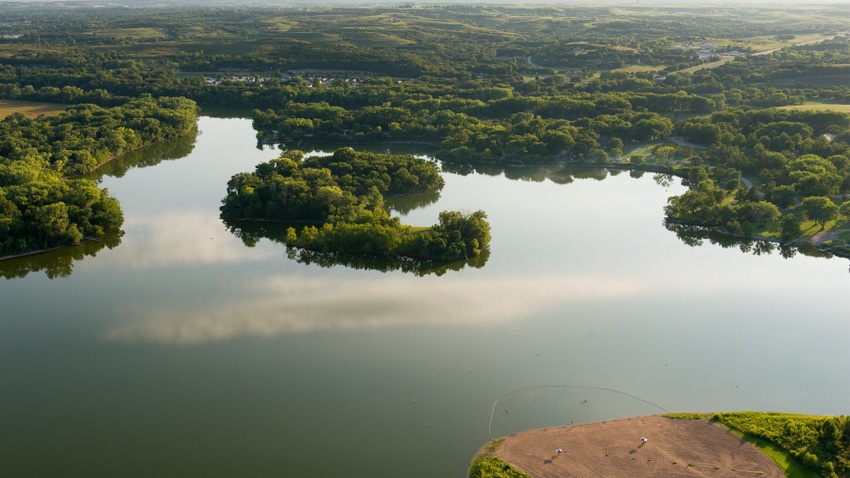
Kansas State University launched the Kansas Water Institute Nov. 14.
Wait, doesn’t the university already have a Water Institute?
“So, the Kansas Water Resource Institute has been housed at Kansas State University as part of the Water Resources Act of 1964,” explains Susan Metzger, director of strategic interdisciplinary program development for K-State and also the director of the KWRI. “It’s always been a fairly small entity housed within the College of Agriculture.” For years, KWRI did impactful work for Kansas farmers using funding from the U.S. Geological Survey, Metzger adds, but its research and expertise typically had an agricultural focus.
The new Kansas Water Institute will build on that legacy, amplify the project to a university-wide level, and broaden the scope of the work to bring in experts from every corner of K-State and beyond. It’s part of the K-State Opportunity Agenda of the Next-Gen K-State Strategic Plan announced this fall.
“The strength of the Kansas Water Institute will be its interdisciplinary approach,” Metzger says. Water issues aren’t just an engineering challenge or a policy challenge; rather, they are many interconnected aspects of environmental, economic and sociological issues. Currently there are more than 75 faculty members just at K-State who are working on water-related issues, but often with a very narrow focus.
“We know that there is so much talent at all of our institutions across the state,” she says. “Why do we operate in silos separate from each other, when we could be pulling together our talents and our resources to tackle these problems together?”
Breaking down walls
The Kansas Water Institute will pull expertise from every K-State college, campus and Research and Extension station, and work with similar experts housed at other state institutions and in the state government. Before this collaborative effort, those experts would be competing for grants and funding from the federal government and other entities against each other. Now, they can coordinate their resources better to compete for those national dollars under the KWI.
Metzger gave the example of PFAS (per- and polyfluorinated substances), the “forever chemical” that’s been found in all of our water supplies. It’s a growing water quality concern for the U.S.
“We know that we have research talent at K-State, and at the University of Kansas, and elsewhere that can help really drive research that would be important on that issue to Kansans,” Metzger says. “We have not yet been able to pull ourselves together in a way to be competitive for those national dollars. This institute allows us to really create that coordination hub to be competitive.” Also at the top of the priority list will be inclusion research on novel irrigation and water management approaches, reservoir sediment reduction strategies, urban stormwater mitigation, risk factors for water contaminant-driven disease, social perceptions and behaviors around water use, and climate modeling.
Farmers are already making many changes to their water use through technology and cropping systems, but there’s more work to be done, Metzger says.
Metzger says one of the most exciting aspects of the Kansas Water Institute will be the student component. She anticipates that it will be a draw for young people interested in water-related issues and a future career in water.
“We have got to recruit and we need the pipeline of talent to fill the workforce because our water resource challenges are not going to be fulfilled in our lifetime,” she says. Having this interdisciplinary approach can not only attract new talent to the field, but help train them to look at problems with a broader scope in the future.
Momentum building
There is a wave of momentum building in the state to put resources toward water. Last year, the Kansas Water Authority voted for the first time to reject planned depletion of the Ogallala Aquifer. This means for the first time, Kansans — including many farmers — agreed to a policy of conservation, not depletion when it comes to the groundwater source.
Kansas Gov. Laura Kelly addressed the state’s Conference on the Future of Water Nov. 15, and spoke about prioritizing the state’s water challenges in her second term.
A new senior advisor on water, Vijay Ramasamy, was added to the governor’s staff to work across agencies and with state and local partners from every sector.
A new water subcabinet was launched that will have representatives from the Kansas Water Office and the Kansas departments of Agriculture, Commerce, Health and Environment and Wildlife and Parks. The water subcabinet will take an all-of-government approach to water issues and programs.
HB 2302 allocated an unprecedented $35 million annual investment in the state water plan for the next five years, fully funding the plan.
The new Kansas Water Institute is part of these efforts.
“We have the governor’s support, we have the legislative support, we have this university coalition driving the research, and we now have that boots-on-the-ground that will get the work done,” Metzger says.
About the Author(s)
You May Also Like






